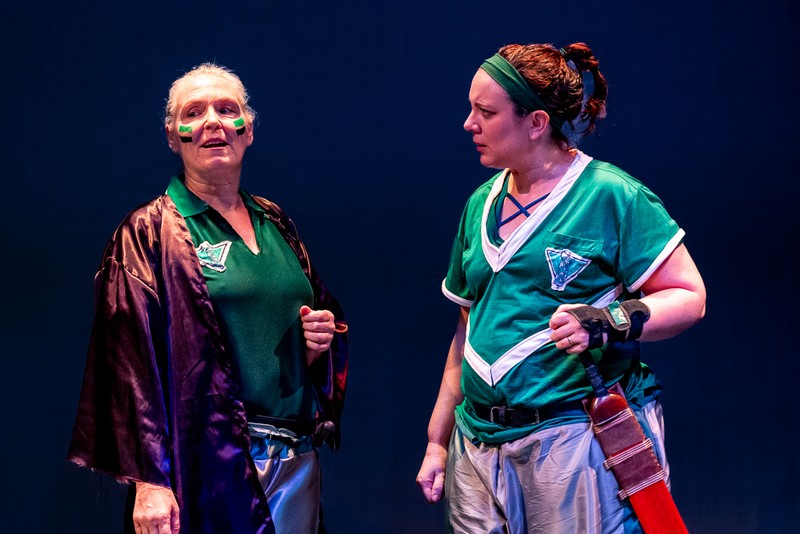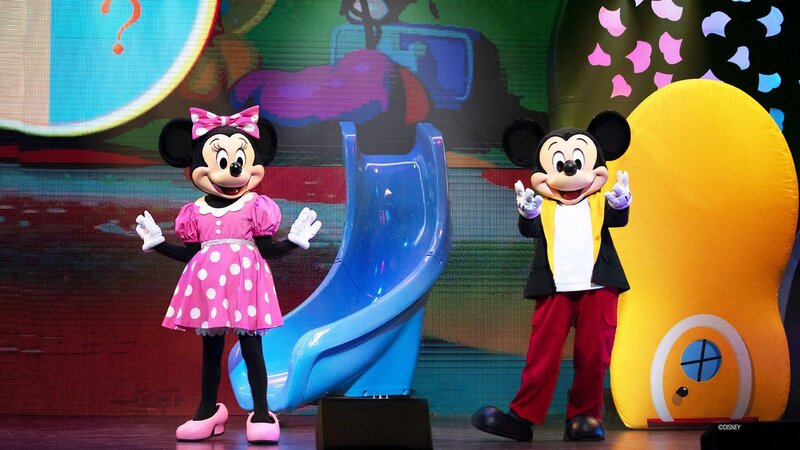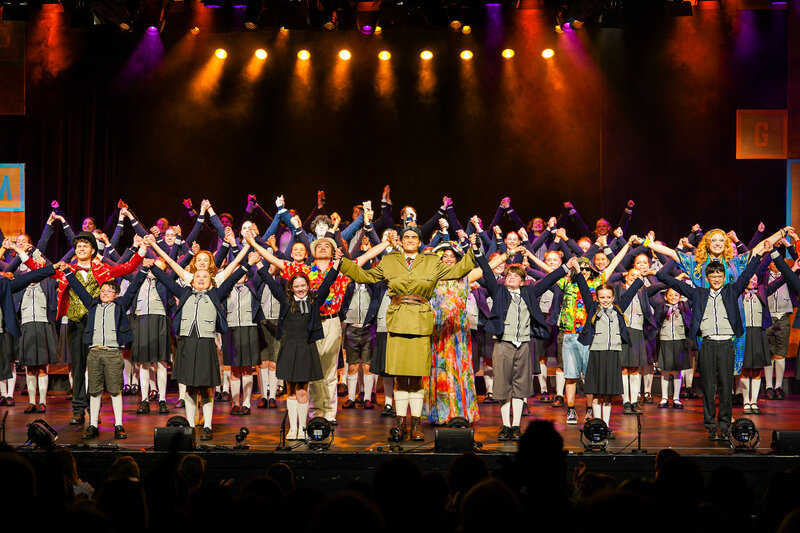Like many of William Shakespeare’s history plays, Julius Caesar is more talk than action. That’s despite the violence at core of its exploration of power, warfare and human nature. In Queensland Shakespeare Ensemble’s production, the angry words of its politics are captured from the outset. Its players charge in line across the stage towards the audience, establishing the sports metaphor at the core of this interpretation of the 16th century work.

As the show’s program reminds us, politics is sport and sport is politics (recent online betting options on the US elections serve as easy reminder). And so, after a whirlwind trip through the historic backstory (aided by the projections of Brooklyn Pace’s multimedia design that periodically provides backdrop and contextual information), we find ourselves in the BC time of celebrated statesman Julius Caesar’s (Lillan Duggan in reflection of the production’s gender-blind casting) return to Rome. Although he has been triumphant in a series of battles, his return is a cause of concern for his inner circle, especially Brutus (Liliana Macarone), who fears that Ceasar’s popularity and tyrannical tendencies serve only as threats to the Great Republic’s democracy.
The fight for power is a high-stakes game. Even after plan is made to end Caesar’s reign, senators, soldiers and civilians find themselves needing to pick a side of support. Cue a stage with football game line markings and on-screen scorecard appearances to pit populist Caesar against best-bud Brutus, in a sporting metaphor that carries through to the stylised choreographic movement of a culminating rugby match battle. There is careful attention to detail in Brigette Bennett’s deceptively simple set design, through the amber, maroon and green flags as trademarks of its main players – Brutus, Cassius (Rebecca Murphy) and the titular Caesar – even to the point of always separating Caesar green from the others in signpost of a lack of any true allies.
Face paint, sporting stripes, sweat bands and tracksuit pants ensure that Harmony Barath’s costume design both reflects the thematic focus and ensures allegiances are clear throughout. The new Avalon Theatre space is also used to good effect in Mark Antony’s (Frankes Marrington) emotional marketplace oration to remind the gathered up-high funeral crowd of Caesar’s qualities before sharing details of his will bequest of money and land to the people of Rome. Similarly, the spill into the audience of the then angry mob intent on revenge and seek out of conspirators, adds another level of interest.
The production features the QSE’s trademark live music accompaniment at key times, building, for example, the tension of the teams’ huddle towards each other in final showdown. A touch of poignancy is introduced as Riley Anderson’s Lucius sings beautifully with his master in a rare show of Brutus’ soft side. Acoustic weather sounds also add to the development of atmosphere, in work with Tim James’s lighting design, particularly in Ides of March foreshadowing and then signal of the disruption to the natural world caused by Caesar’s murder and later supernatural appearance of his ghost to torment Brutus with foretell of impending doom at Philippi. Decisive choreography also works towards ensuring a dynamic production of what so easily could have been a bland historical recount.
A hallmark of QSE productions is that easy access to the text’s language is encouraged and, as always, Rob Pensalfini’s direction leans into his focus. It allows the story’s key players ample time and space to grapple with its dialogue. Duggan makes for a solid Caesar, showing versatility through her dual role as the dictator’s distant nephew Octavius Caesar who joins with Mark Antony as co-antagonist opposing Cassius and Brutus. Marrington is a memorable General Antony, passionately mourning Caesar almost to the point of overwhelm, yet also conveying the confidence of a master orator adept in the use of rhetoric.

Macarone is a standout as fraught hero Brutus, easily conveying the character’s complexity and conflict over killing his close friend Caesar for the betterment of Rome. In her capable hands, it is easy to appreciate his honour and wisdom, especially in the character’s early soliloquy talk though his inner turmoil, which is appropriately poised and perfectly executed in terms of not only its rhythmic patterns but accompanying gestural language.
Murphy, meanwhile, has the confident stance of shrewd and manipulative conspirator Cassius, until the last Roman effectively falls upon his own sword. And they are all supported by a strong ensemble cast (including Meg Bennett, Mikala Crawley Leah Mustard and Scott Mair and Angus Thorburn), each assuming multiple roles of respective significance, such as Dom Tennison’s Soothsayer attempt to warn Caesar of the plot against him.
The efforts of the talented performers, in combination with Pensalfini’s wise directorial decisions, ensure this Julius Caesar has an appealing excitement, but not at the expense of the original text. Indeed, even as an introduction to the work, the production stands strong in its clarity of characters, plots and political themes not so new.





